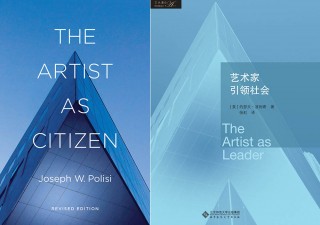Title

The first edition of my book The Artist as Citizen was published by Amadeus Press in 2005. I had decided to write it because Juilliard was celebrating its centennial, and the essays and speeches within reflected my thoughts about the school since I began my tenure in 1984.
Body
In 2015, while my colleagues and I were deeply involved with the creation of The Tianjin Juilliard School, I learned that an edition in Chinese might be of interest to the many thousands of Chinese music students and professionals who were looking towards a new way of addressing the music profession in their vibrant country. With the assistance of Hong Mautz, our China advisor, who translated the book into Chinese, I proceeded to have a revised edition published by Beijing Normal University Press. For this edition, I decided to add several new essays and speeches and to completely update the edition to reflect my thoughts as of 2016. For clarity of translation purposes, the title was changed to The Artist as Leader. When Amadeus Press learned of this China venture, they asked if I would develop a revised edition in English, which was ultimately released in late April.
Aside from a considerable update in the book’s final chapter, Planning for the Twenty-First Century, which brings many aspects of the Juilliard experience to the present day, the two new elements that are addressed in the book’s revision are discussions of the aspirations of a global Juilliard and the importance of entrepreneurial elements in all areas of the school’s curriculum.
In connection with the concept of a global Juilliard, I discuss the importance of Juilliard remaining at the forefront of performing arts education worldwide and our efforts to ensure this, particularly through the creation of a branch campus in China, The Tianjin Juilliard School, as well as by other initiatives of Juilliard Global Ventures in providing access to Juilliard education for a wide array of learners in new geographies through site-based and digital education.
In describing future entrepreneurial activities at Juilliard, I emphasize that students should understand the various marketing, business, and structural issues involved with the development of new projects in dance, drama, and music. This will incentivize them to effectively address the professional challenges before them as they begin their careers.
I have been humbled and deeply touched by the reception that The Artist as Citizen has garnered since it was first published. Alumni of all three Juilliard divisions have taken up the challenges that I discuss and have made them their own, creating programs worldwide which bring together superb artistry with a sense of mission that the arts need to be understood by our world’s population.
As I wrote in the original edition: “In titling this volume The Artist as Citizen, I have wanted to emphasize my belief that artists of the twenty-first century must re-dedicate themselves to a broader professional agenda that reaches beyond what has been expected of them in an earlier time. Specifically, the twenty-first century artist will have to be an effective and active advocate for the arts in communities large and small around the globe. These artists must be not only communicative through their art, but also knowledgeable about the intricacies of their society—politically, economically, socially—so that they can effectively work toward showing the power of the arts to nations and their people who are often uninformed about the arts and view these activities with suspicion, occasional disdain, and frequently as being irrelevant.”
It has been gratifying to know that these words continue to live on in the extraordinary work of Juilliard students and alumni around the globe.




